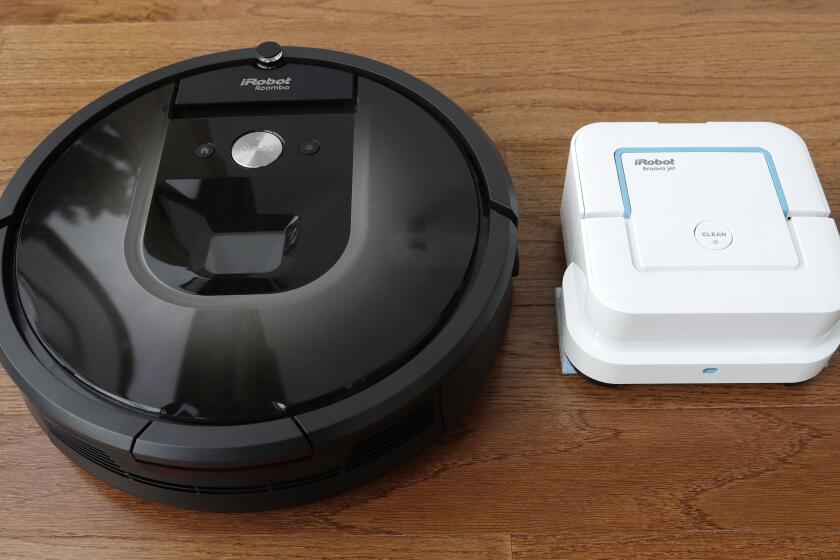The inexorable march of technology: music in your ear and a light on your porch
Our microchip technology has made Christmas giving easy. We can place miracles in the hands of our loved ones--miracles that were not even dreamed of 50 years ago.
But miracles can refuse to work, too.
We bought an Apple computer for our older son’s three children, aged 4, almost 8 and almost 10.
A computer is not inexpensive, but our son was sure the children were ready for one, and we are convinced that a computer is an excellent educational tool, the only thing that will draw children away from the mesmerizing pull of television.
I wasn’t too sure about Trevor, the youngest. He is at that age when his mechanical skill is measured by how quickly he can dismantle anything that works. But we hoped he could be restrained from sabotaging the Apple. Computers aren’t easy to damage, anyway, unless you take a hammer to them.
But they’re great at self-destructing.
Our son spent Christmas Eve putting it together. Like many electronic gadgets, they come disassembled, with instructions written by someone for whom English is not his native tongue.
Having received his electronic training in the Air Force, our son is good at that sort of thing. He understands computers in a way that I never will. He worked patiently and carefully, checking every move he made against the instruction book.
Finally it was assembled. We gathered round and watched as he pushed the key to start the program.
A blunt message appeared on the screen: “SYNTAX ERROR.”
Undismayed, he tried various corrective procedures. But every time he got a SYNTAX ERROR.
Finally, in desperation, he telephoned our younger son at home. He, too, understands computers, and he happens to own an Apple.
They conferred. Our older son made several attacks on the instructions of his brother. He never escaped that mean little message, SYNTAX ERROR.
Also exploiting advanced technology, my wife gave me two new discs for my compact disc player. This is a small, portable machine that plays small discs by laser beam, so that there is no needle, no scratching sound, and no wear and tear on the records. She bought me the player in the first place so that I can plug in earphones and listen to music while I am rowing the machine on my morning visits to the Pasadena Athletic Club. Rowing a machine that isn’t going anywhere is among the most boring of human activities; listening to music helps.
She got me a collection of songs by Willie Nelson and a collection of blues by Duke Ellington. (I had been listening to Beethoven so much that I believe I could conduct the Second Symphony.)
When we got home that evening I noticed that, as I turned the corner and pulled up in front of our house, the front porch light went on.
“That’s funny,” I said. “Our porch light went on.”
“We must have left it on,” she said.
But I was sure I had seen it go on. I had an uneasy feeling that someone might be in the house.
We opened the door and found the house empty. When we shut the door the porch light went out.
“That’s really crazy,” I said.
I opened a bottle of champagne and played the Willie Nelson disc, attaching my CD to our big stereo speakers. I figured I was entitled to a glass of champagne since I hadn’t had a drop all day, not wanting to add to the number of drunks on the freeways.
Willie Nelson was great. His voice is warm, resonant, poignant, flexible and sly. He is right up there with the great interpreters of song. Edith Piaf. Tony Martin. Frank Sinatra. Jennie Tourel. Emma. Ella Fitzgerald. Peggy Lee. He will help me row across many an imaginary Hellespont.
The phone rang. It was our younger son’s wife.
“Mr. Smith!” she said, sounding excited. “You are home?”
“Yes,” I said. “Of course I’m home.”
“Did you notice anything?”
Suddenly it occurred to me that she must be talking about the way the front porch light went on.
“Well,” I said, “when we drove up the front porch light went on.”
“It worked!” she cried. “Wonderful!”
“What are you talking about?” I asked. She’s always up to something.
She said that in our absence she and her husband had come by our house and installed a “security system,” for Christmas. There was some kind of infrared cell that was sensitive to heat, so that whenever anything warm came up on the porch, like a person, it turned on the light.
I had her put our son on. I told him the light had gone on when we turned the corner.
“It’s more sensitive than I thought,” he said.
“That means,” I said, “that any car that turns the corner will turn on the light.”
“That’s true,” he said. “I’ll have to adjust it.”
I also pointed out that if the light went out automatically, after the bodies were removed, we wouldn’t be able to leave the light on for expected visitors.
“That’s true,” he admitted.
He said he would put in another light that we could leave on if we liked.
I had another glass of champagne and played the Ellington record. “Wabash Blues.” “Basin Street Blues.” “Beale Street Blues.” It was exquisite. Ellington’s piano: eloquent, subtle, intricate, enchanting. Harry Edison’s trumpet on one speaker, Johnny Hodges’ alto sax on the other. Ellington is the greatest musician of our century.
The front porch light went on again.
I opened the door.
It was the cat.



